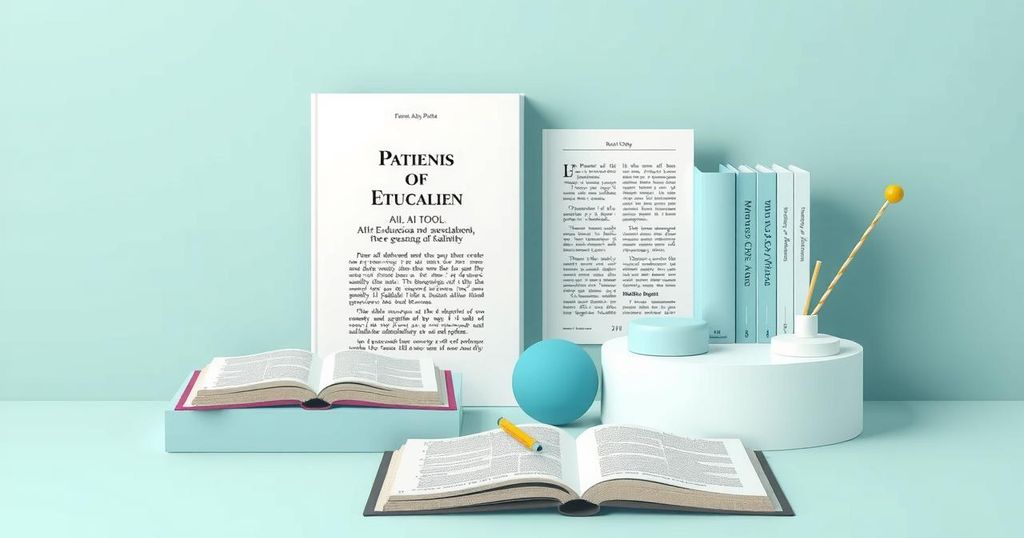AI Tools Enhance Readability of Patient Education Materials
A recent study from NYU Langone Health indicates that AI tools drastically improve the readability of patient education materials, making them more accessible. Evaluating three large language models, researchers found that these tools can simplify complex medical texts effectively, benefitting patient comprehension and care outcomes.
A new study has found that artificial intelligence (AI) tools can significantly enhance the readability of patient education materials (PEMs), making them easier for people to understand. Researchers at NYU Langone Health took a hard look at PEMs available from high-profile sources like the American Heart Association, American Cancer Society, and American Stroke Association, noting that many of these documents often soar above the recommended grade 6 reading level. That’s a bit of a barrier for many patients trying to navigate their healthcare decisions, which is where this study comes in.
The research tapped into three large language models (LLMs) – ChatGPT, Gemini, and Claude – to see if they could simplify these complex texts while still keeping the essential facts intact. Essentially, these models utilize a predictive technique that allows them to rewrite content in simpler language while maintaining accuracy. The study, published on April 10 in the Journal of Medical Internet Research, was built on an analysis of 60 PEMs randomly selected from the health organizations’ websites.
After evaluating the initial readability scores—ranging from a mean grade level of 9.6 to 10.7—the researchers proposed that LLMs could lend a hand. And the results? Quite impressive! After going through the models, ChatGPT brought the score down to a 7.6 grade level, Gemini hit 6.6, and Claude brought it even lower to 5.6. Alongside improved readability, the word counts shrank considerably, making the materials not only simpler but also more concise—a win-win situation.
Jonah Feldman, MD, who directs transformation and informatics at NYU Langone, remarked, “Our study shows that widely used LLMs have the potential to transform patient education materials into more readable content, which is essential for patient empowerment and better health outcomes.” That’s a crucial takeaway, especially since even professional medical writers can benefit from a little AI assistance.
Dr. Feldman, who holds a position at NYU Grossman Long Island School of Medicine, further stated that these findings highlight how healthcare organizations can embrace AI to make communication more patient-friendly. Previous research has already shown AI’s capacity to simplify explanations of heart test results or create understandable summaries of complex medical reports. It’s a wide arena, and the potential applications are exciting.
The study co-author Paul A. Testa, MD, JD, emphasized the global impact of this research. “The breadth of possible AI offerings shows how technology can be leveraged to transform the patient experience across health care systems, and not just in the United States.”
So, it’s not just theoretical. The NYU Langone team is already piloting these AI tools in a randomized trial, using AI-generated summaries for hospital discharge instructions. The objective? To see if these improved materials enhance patient understanding and satisfaction. It looks like they’re really aiming for better post-discharge care, which could make all the difference for many individuals.
“Generating real-world evidence through randomized trials is crucial for validating the effectiveness of AI tools in clinical settings,” said Jonah Zaretsky, MD. As he pointed out, this isn’t just about having accurate AI-generated documents but ensuring that they are genuinely helpful for patients and their families.
The study was self-funded by NYU Langone and included contributions from several researchers, including lead author John Will and co-authors Mahin Gupta and Aliesha Dowlath. Exciting times ahead for utilizing technology in healthcare!
In summary, AI tools are opening new doors in how patient education materials can engage and inform. The NYU Langone study shows promising results for simplifying complex medical information, which could hugely impact patient experiences and outcomes. With ongoing trials and AI applications, the healthcare industry seems to be moving towards a more accessible and understandable future.
Original Source: nyulangone.org




Post Comment